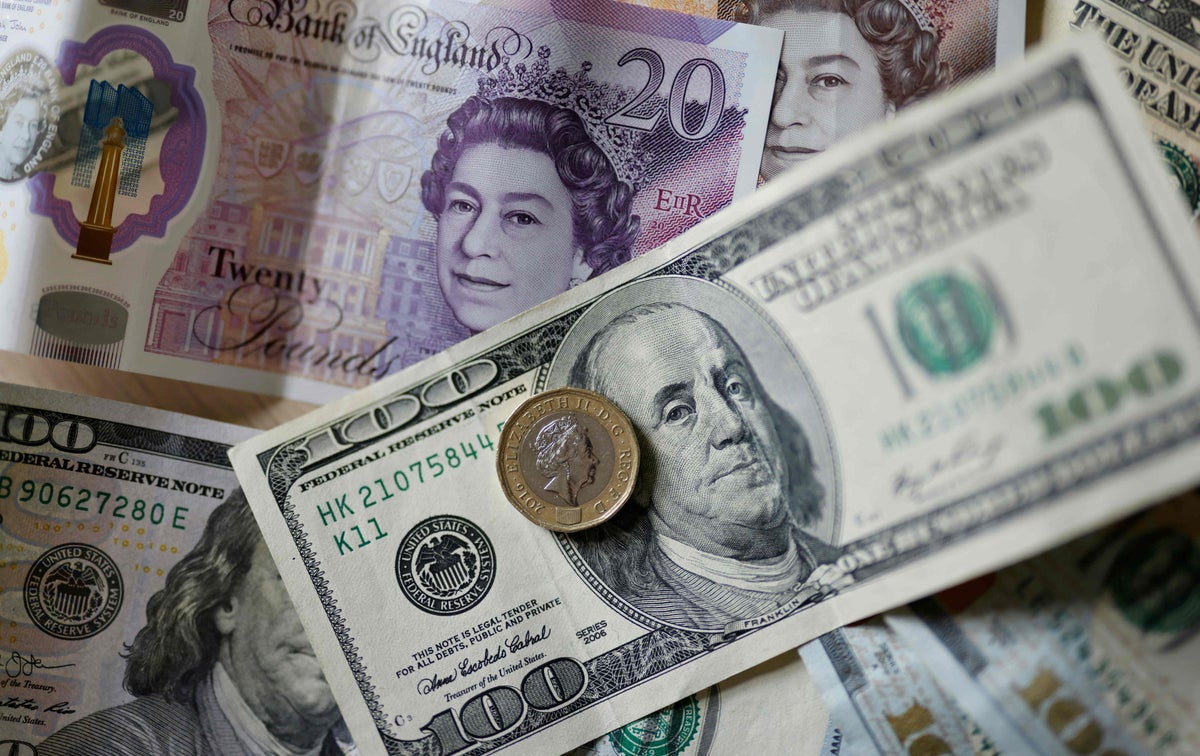
The pound pulled back from its lowest level against the dollar in history, falling more than 4 per cent, as the markets responded to the announcement of Britain’s biggest tax cuts in 50 years.
Sterling tumbled to $1.035 on Monday in early Asia trading before it regained some ground to a 20-year low of $1.05 before recovering further to $1.078 at 4pm this afternoon.
Chancellor Kwasi Kwarteng was accused of “fanning the flames” of the plummeting pound by hinting at fresh “unfunded” tax cuts, Labour said after Sterling hit its lowest level against the dollar since decimalisation in 1971.
The chancellor said on Sunday that there was “more to come” on tax cuts following his mini-Budget revealed a huge expansion in borrowing to pay for the £45bn tax cut spree.
He and Liz Truss have dismissed analysis indicating that the plan – which include abolishing the top rate of income tax for high earners – will see only the incomes of the wealthiest households grow.
The pound was buying less than a euro or dollar at one international bureaux de change this morning. The Change Group office at London St Pancras International was selling €100 for £108.84 – valuing the pound at less than 92 euro cents.
Additionally, interest rate expectations are rising “by the minute”, according to reports with charts showing the market is anticipating that the bank rate will hit 6 per cent within the first half of 2023.
Some have raised the possibility that the Bank of England may have to call an emergency meeting to raise interest rates again. Leading economist Mohamed El-Erian said the Bank of England should raise the interest rate “by one full percentage point to try and stabilise the situation”.
Sir John Gieve, former deputy governor of the Bank of England, told the BBC: “That is what they’ll have to do if they want to change base [interest] rates.” But he added: “Emergency meetings are avoided if at all possible and I am sure they will try to avoid it.”
One of the chancellor’s allies told The Times the drop in the pound’s worth was merely “City boys playing fast and loose with the economy ... it was bound to happen. It will settle”.
Labour’s Rachel Reeves said on Monday she was “extremely worried” about the latest slump in the pound. She said Ms Truss and Mr Kwarteng were “behaving like two gamblers in a casino chasing a losing run”.
The Labour frontbencher said the chancellor had been “fanning the flames” of the pound’s decline by talking up more tax cuts. “The chancellor instead of doubling down on his position on Friday needs to now set out credible plans,” she told BBC Radio 4’s Today programme.
Chloe Smith, the work and pensions secretary, told Sky News: “I wouldn’t be able to comment on market movements … lots of factors go into market movements.”
In an interview with CNN, Ms Truss rejected comparisons with Joe Biden’s approach, after the US president said he was “sick and tired of trickle-down economics”. Asked whether she was “recklessly running up the deficit”, Ms Truss said: “I don’t really accept the premise of the question at all.”
Mr Kwarteng and Ms Truss could continue their spree in the New Year, with possible further reductions in income tax and the loosening of immigration rules and other regulations.
The government is reportedly considering abolishing a charge for parents who earn more than £50,000 and claim child benefit, increasing the annual allowances on pension pots and a tax break for people who stay at home to care for children or loved ones.
The £45bn tax-slashing package was met with alarm by leading economists, some Tory MPs and financial markets, fuelling predictions sterling could plunge to parity with the US dollar by the end of the year.
Such a slump could trigger a rebellion from Tory backbenchers, who could refuse to vote for the government’s finance bill or submit letters of no confidence, The Telegraph reported, citing backers and critics of the PM.
In a sign of Tory unease, Conservative former chancellor George Osborne urged the government to end the “schizophrenic” policy of slashing taxes and increasing borrowing.
Mr Osborne told Channel 4: “Fundamentally, the schizophrenia has to be resolved – you can’t have small-state taxes and big-state spending.”
Tory grandee Ken Clarke compared the Truss-Kwarteng plan to cuts taxes for “the wealthiest 5 per cent” to Latin American governments. “I’m afraid that’s the kind of thing that’s usually tried in Latin American countries without success,” he told BBC Radio 4.
Former deputy PM Damian Green told GB News “there’s more to conservatism than tax cutting”, and said with a general election in two years things “have to happen quickly”.
Labour leader Sir Keir Starmer, who pledged that a Labour government would reinstate the top income tax rate of 45 per cent, hit out at the government’s “wrongheaded” economic policies.
The sluggish performance of the pound has added to the concerns of investors amid a bleak market outlook and the risk of recession, as winter approaches and the war continues in Ukraine.
The price of imports of commodities valued in dollars, such as oil and gas, are set to soar if the pound continues to remain at such a low level against the US currency.







